
Sex differences in autoimmune illness were the focus of the first conference convened by the Barbara Volcker Center for Women and Rheumatic Disease.
Brad Hess; Chinnapong / SHUTTERSTOCK.COM
Although two decades have ticked by, rheumatologist Michael Lockshin, MD, MACR, still remembers the enlightening nature of many conversations he had with his curious and persistent patient Barbara Volcker, the wife of former U.S. Federal Reserve Chairman Paul Volcker.
“The conversations we had at that time led to the mission of the Barbara Volcker Center,” says Dr. Lockshin, director of the Barbara Volcker Center for Women and Rheumatic Disease at the Hospital for Special Surgery (HSS) in New York City and professor of medicine and obstetrics-gynecology at Weill Cornell Medical College.
A patient with rheumatoid arthritis (RA), Mrs. Volcker moved with her husband to New York in the mid-1970s, where she continued her medical care at HSS with Dr. Lockshin as her physician. She had many questions about why her illness affects mostly women, how it might affect pregnancy and why diagnoses change with passing years.
“She was the type of patient that I really enjoyed taking care of because she challenged me on everything,” says Dr. Lockshin. “She would say, ‘But that answer doesn’t make sense. Give me the information behind it. Convince me.’ She drove me to question my own assumptions to respond to her.”
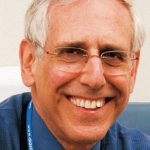
Michael D. Lockshin, MD, MACR
Mrs. Volcker continued to see Dr. Lockshin for treatment of her RA during her husband’s stint as Federal Reserve chairman. Later, near the end of her life, the Volcker family provided a financial gift to honor Barbara Volcker and initially fund the center established in her name.
“She was always very interested in the reasons why there are sex discrepancies” in the disease, Dr. Lockshin says about Mrs. Volcker. “That became our focus. We put forth two conferences on the topic. We funded a fair amount of research addressing that issue.”
The Center convened a conference on the biology of sex differences in autoimmune illness—the first of its kind—within a year of opening its doors, notes Dr. Lockshin. The topic later gained national attention for all human health when the Institute of Medicine (later renamed the National Academy of Medicine) convened a committee to address the same question and published a report in 2001, according to Dr. Lockshin, who served on the committee. Doruk Erkan, MD, MPH, a rheumatologist at HSS whose early research focused on antiphospholipid syndrome, joined the Center in 2005 as physician-scientist.1,2
Center Founding & Focus

Mikhail Olferiev, MD
In the late 1990s, Mrs. Volcker’s health worsened, and the Volckers offered to establish a center at HSS to honor her. Dr. Steven Paget, who was physician in chief at HSS, and Dr. Charles Christian, who was the emeritus physician in chief, invited Dr. Lockshin, then acting director of the National Institute of Arthritis and Musculoskeletal and Skin Diseases (NIAMS), to discuss the center’s mission, and he was ultimately offered the job as director, a position he still holds.
Founded in 1997, the Barbara Volcker Center for Women and Rheumatic Disease is marking 20 years of research and clinical work undertaken by scientists, rheumatologists, orthopedists, endocrinologists and obstetrician/gynecologists devoted to women with various rheumatic conditions. Its physicians annually see more than 3,000 individual patients for issues of pregnancy and contraception, antiphospholipid syndrome, overlapping or undifferentiated rheumatic illness, and other aspects of systemic autoimmune illnesses, according to Dr. Lockshin.
“The things I think that have been unique, or at least different, is the focus on gender issues—what we think of as the why-women question,” says Dr. Lockshin.
Many autoimmune rheumatic diseases, such as RA, lupus, scleroderma and others, predominantly affect women and have a significant impact on their quality of life, notes Mikhail Olferiev, MD, a research associate at HSS who received a grant from the Center.
“The complexity of autoimmune diseases and the lack of understanding of mechanisms triggering autoimmune processes make it hard to explain the female predominance,” says Dr. Olferiev.
Founded in 1997, the Barbara Volcker Center for Women & Rheumatic Disease is marking 20 years of research & clinical work undertaken by scientists, rheumatologists, orthopedists, endocrinologists & obstetrician/gynecologists devoted to women with various rheumatic conditions. Its physicians annually see more than 3,000 individual patients.
The Center’s clinical focus and research priorities on gender and pregnancy issues in autoimmune disease mirror the interests of HSS physicians, such as Lisa Sammaritano, MD, and Jane Salmon, MD, co-investigators of a multicenter study on hormone treatment in lupus and another on pregnancy in lupus patients, both sponsored by NIAMS.3,4 Other research by Dr. Salmon’s laboratory described mechanisms of antiphospholipid-associated pregnancy loss.5 Dr Lockshin’s longtime interest in topics of sex differences in autoimmune disease, antiphospholipid antibody and pregnancy loss and incomplete lupus also aligns with the Center, he says.
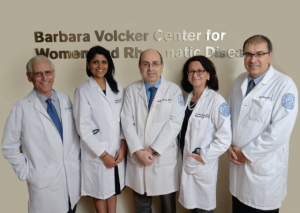
The Barbara Volcker Center physician team, from left: Michael Lockshin, Medha Barbhaiya, Kyriakos Kirou, Lisa Sammaritano and Doruk Erkan.
Over time, concepts and ideas about pregnancy and issues related to women with rheumatic diseases has changed due in part to discoveries of researchers connected with the Center, says Dr. Lockshin. For example, the Center participated as co-investigators in those two large multicenter studies (noted above) on pregnancy and hormone use, in which Dr. Salmon of HSS was one of two principal investigators, along with Jill Buyon, MD, a rheumatologist at NYU Langone Medical Center.
Both ended up being “really powerful studies that produced a huge amount of new information” from both a management and clinical standpoint, says Dr. Lockshin.
“I think I can say that the way in which we approach pregnancy in 2017 has done a 180-degree turn from before we started,” Dr. Lockshin says. “It used to be said that pregnancy would invariably cause lupus to flare up, and therefore, it was contraindicated in all lupus patients. That turns out not to be true. It doesn’t flare up in pregnancy. There are certain complications that resemble lupus flares, which were being mistaken.”
Another misconception that autoimmune disease posed an absolute universal threat to a fetus also has been debunked, according to Dr. Lockshin
“There are specific blood tests that you can do that can identify which fetuses are at risk and which are not,” he says. “It’s a minority of fetuses that are at risk, but we can pretty much identify those on day one of the pregnancy.
“Now we can predict who is going to get into trouble and who is not.”
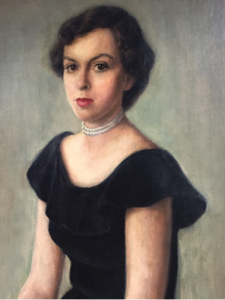
This painting of Barbara Volcker was a gift from her husband, Paul, and hangs in a place of honor at the Center.
A related concern is the health of the baby, which depends primarily on birth weight and gestational age, he says. “If we get the baby to term, that baby is just as healthy as any other baby. There’s no special risk that we identify with autoimmune disease.”
The pursuit for answers to Mrs. Volcker’s questions illuminated issues that transcend rheumatology and led the Center to create a course on chronic illness, says Dr. Lockshin. In talking to medical students, he noticed that they had a much greater grasp on acute illness than chronic illness, how it evolves over time and how it can take years to settle on a diagnosis.
With chronic illness, patients and their doctors often deal with uncertainty. This is a concept that is not talked about much in medicine, notes Dr. Lockshin.
“It’s understanding that chronic illness is not the same as acute illness and that not all things are black and white,” he says.
To address these issues, the Center created a seminar course on chronic illness at Weill Cornell Medical College. In the seminars, students and patients, sitting in the same room, explored these issues together. The seminars, based on Barbara Volcker’s questions, became the source of two lay-language books on process of diagnosis and the management of uncertainty, according to Dr. Lockshin. The books present the same conversation, directed this time to a public audience, in a different format, he says.6,7
Not all the questions have answers yet, but the Center has fostered research that’s brought “a great deal of light” to possibilities, says Dr. Lockshin. Those conversations initiated by Barbara Volcker decades ago continue to inspire the Center’s overarching goals and serve its mission.
“Her questions are the core of the Center that bears her name,” says Dr. Lockshin.
Several of its members hold leadership positions associated with the Center’s mission, according to Dr. Lockshin. For example, Dr. Erkan chairs both the Antiphospholipid Syndrome Alliance for Clinical Trials and International Networking, headquartered at the Center, and the 15th International Congress on Antiphospholipid Antibodies. Kyriakos Kirou, MD, conducts lupus nephritis clinical trials, and Dr. Sammaritano chairs the ACR Reproductive Health Guideline Project. With a background in environmental causes of autoimmune illnesses, Medha Barbhaiya, MD, MPH, is involved with the ACR. In addition, Dr. Lockshin served on committees with a focus on pregnancy, sex differences, and other aspects of autoimmune illness and he is past editor in chief of Arthritis & Rheumatism (now Arthritis & Rheumatology).
Fostering & Funding Research
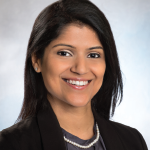
Medha Barbhaiya, MD, MPH
Currently, the Center funds annual grants awarded to junior faculty at HSS and collaborating institutions within Weill Cornell Medical College. The only criterion is that they align with one of the mission areas of the Center, says Dr. Lockshin.
“We have things that have been as disparate as very basic science, such as … the way in which genes are activated, and others which are very social medicine-type things, like how people interact in their families, and so on.”
Grant recipient Dr. Olferiev and his colleagues experimented with RNA sequencing to investigate the expression of thousands of genes across health donors and patients with systemic lupus erythematosus (SLE). They identified hundreds of genes that affect males with SLE, although “many of those genes are well known and implicated in SLE pathogenesis of both genders, Dr. Olferiev said in an email.
“Our results might indicate that those transcripts represent a gene signature predisposing females to autoimmune conditions,” writes Dr. Olferiev. “What is the exact role of such genes? The answer to that question will require additional experiments, but it was clear that it can’t be explained by simple hormonal regulation.”
Funding from the Barbara Volcker Center helps support continued work on dissecting the mechanisms behind gender bias in autoimmune rheumatic disease, he says.
“I hope that my study will contribute to a better understanding of an autoimmune disease and possibly identify new therapeutic targets” says Dr. Olferiev.
Researcher Theresa Lu, MD, PhD, received a Barbara Volcker Center grant as seed money to explore whether fat tissue might influence stromal cells in lymph nodes to contribute to sexual dimorphism in rheumatologic diseases.
“The short answer was ‘no,’ but we learn even from negative results and the grant allowed us to explore further about fat tissue mesenchymal stromal cells and skin fibrosis in scleroderma, a disease that affects women more than men,” Dr. Lu wrote in an email. “We found that fat tissue mesenchymal stromal cell survival is maintained by dendritic cells in fibrotic skin and that prolonging the survival of therapeutically delivered stromal cells can ameliorate skin fibrosis. Thinking about skin pathology additionally helped to move forward a project on lupus photosensitivity.”
Results of her skin fibrosis research were published last year in the Journal of Clinical Investigation and led to another grant from the Scleroderma Foundation.8 That grant will support Dr. Lu’s investigation to further understand the survival mechanisms. “We are hoping to utilize this understanding to improve mesenchymal stromal cell therapy in scleroderma as well as other diseases,” says Dr. Lu.
‘I think I can say that the way in which we approach pregnancy in 2017 has done a 180-degree turn from before we started,’ Dr. Lockshin says. ‘It used to be said that pregnancy would invariably cause lupus to flare up, & therefore, it was contraindicated in all lupus patients. That turns out not to be true.’
Over the years, the Barbara Volcker Center has expanded its reach and in 2012 it received a substantial additional endowment from the Volckers and non-endowment gifts from other donors attracted to its mission, according to Dr. Lockshin.
In 2014, the Center moved to larger office space and recruited new members, including Dr. Sammaritano, known for her work in pregnancy complications and hormone treatment of patients with autoimmune disease, and Dr. Kirou, a physician-scientist in the field of academic rheumatology with a background in mechanisms of lupus nephritis.
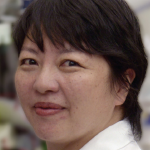
Theresa Lu, MD, PhD
A recent member to join the Center is Dr. Barbhaiya, who as a medical resident at Weill Cornell Medicine (New York Presbyterian Hospital) had worked with the Center. She is an authority on environmental aspects of autoimmune illness, such as obesity, alcohol, smoking, race and socioeconomic status, and was recruited in 2017 from the Brigham and Women’s Hospital in Boston.
“My first introduction to the Barbara Volcker Center was when I began working on research projects with Dr. Michael Lockshin and Dr. Doruk Erkan as a medical student at Weill Cornell Medical College nearly a decade ago,” recalled Dr. Barbhaiya in an email. “Although I left New York to complete my rheumatology fellowship at the Brigham and Women’s Hospital, where I subsequently joined the faculty, what drew me back to HSS as a faculty member was the Barbara Volcker Center’s strong emphasis on clinical care and clinical research related to lupus, antiphospholipid syndrome, and pregnancy in rheumatic diseases.”
The Center’s investigators focus on answering challenging questions related to better understanding the etiology and outcomes of potentially debilitating autoimmune diseases in order to improve patient care, says Dr. Barbhaiya.
“Furthermore, the Barbara Volcker Center’s dedication and support for the career development of junior faculty members is particularly unique, especially in a very challenging funding environment,” she says.
Paul Volcker Reflects on Center Named for His Wife
During a telephone interview from his home, former Federal Reserve Chairman Paul Volcker, 90, says he is delighted with the Center’s accomplishments over the years and says he is sure that if Barbara Volcker were alive she would be “very pleased and happy that her name was attached to it, no doubt in my mind.”
Barbara Volcker had a severe case of RA and a lifelong battle with diabetes. She died in 1998 at the age of 68; Paul Volcker married his current wife, Anke Volcker, in 2010.
“There was no cure for rheumatoid arthritis—and I guess there isn’t now—but there are a lot better treatments for it now than there were 20 or 30 years ago,” says Paul Volcker.
When asked what he hopes for the future of the Center, he chuckles and says, “Well of course, I’d like to see it go on, but I won’t be here forever. … I’d like them to conquer autoimmune disease and lupus in women.”
Catherine Kolonko is a medical writer based in Oregon.
References
- Wizemann T, Pardue ML, editors. Exploring the biological contributions to human health: Does sex matter? Institute of Medicine Report, Washington: National Academy Press, 2001.
- Erkan D, Bateman H, Lockshin MD. Lupus anticoagulant-hypoprothrombinemia syndrome associated with systemic lupus erythematosus: Report of 2 cases and review of literature. Lupus. 1999;8(7):560–564.
- Buyon JP, Petri MA, Kim MY, et al. The effect of combined estrogen and progesterone hormone replacement therapy on disease activity in systemic lupus erythematosus: A randomized trial. Ann Intern Med. 2005 Jun 21;142(12 Pt 1):953–962.
- Lockshin MD, Kim M, Laskin CA, et al. Prediction of adverse pregnancy outcome by the presence of lupus anticoagulant, but not anticardiolipin antibody, in patients with antiphospholipid antibodies. Arthritis Rheum. 2012 Jul;64(7):2311–2318.
- Salmon J, Girardi G, Lockshin MD. The antiphospholipid syndrome—A disorder initiated by inflammation: Implications for therapy of pregnant patients. Nat Clin Pract Rheumatol. 2007 Mar;3(3):140–147.
- Brill A, Lockshin MD. Dancing at the river’s edge: A patient and her doctor negotiate life with chronic illness. Tucson: Schaffner Press, 2010, 255.
- Lockshin MD. The prince at the ruined tower. New York: Custom Databanks Inc., 2017, 246.
- Chia JJ, Zhu T, Chyou S, et al. Dendritic cells maintain dermal adipose-derived stromal cells in skin fibrosis. J Clin Invest. 2016 Nov 1;126(11):4331–4345.

